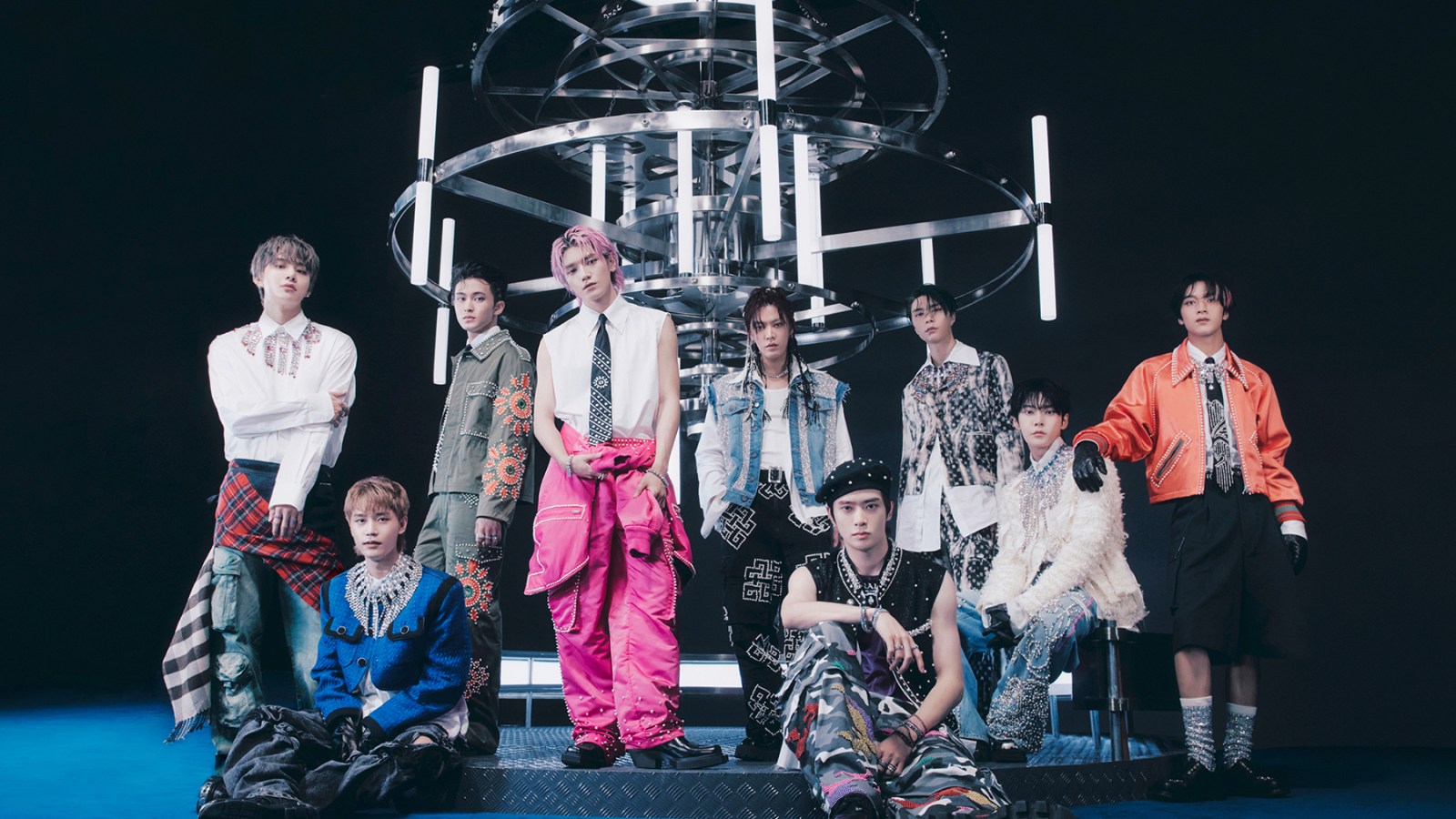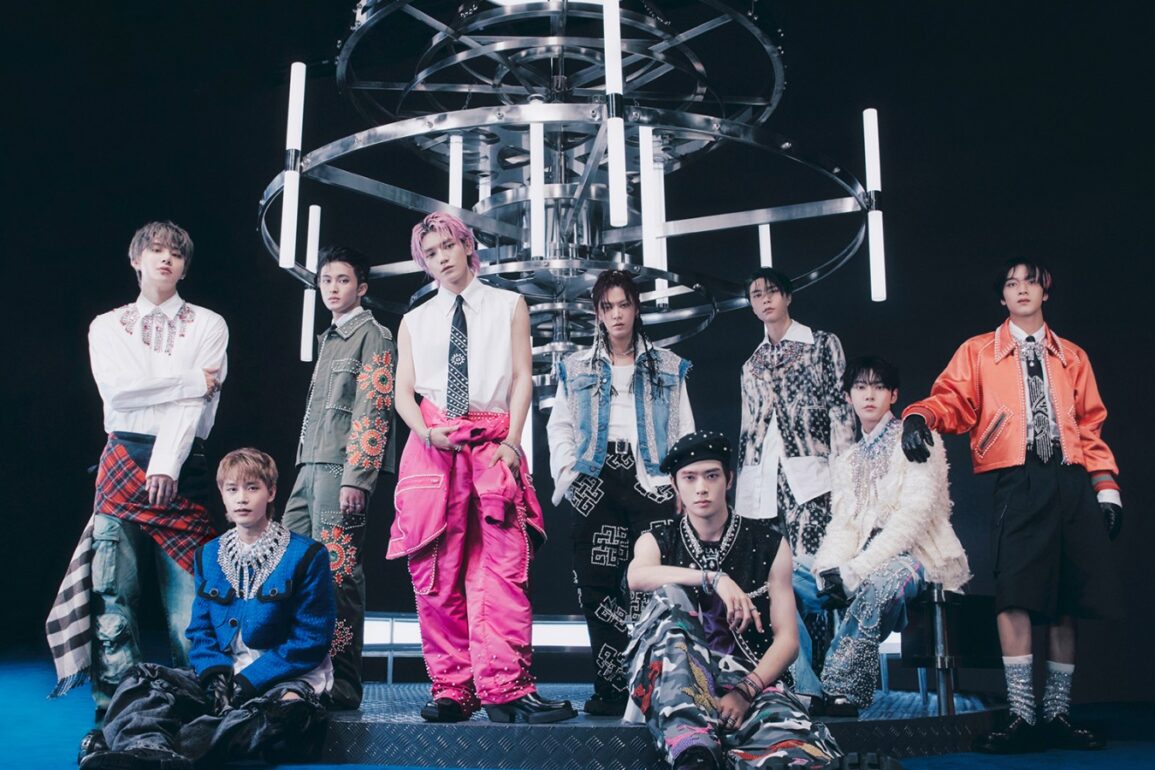
NCT 127 sit on the kind of colorful, hard plastic chairs you’ll find in offices or assembly halls anywhere in the world. The hair is mussed, faces are bare of makeup, their off-duty wardrobe consists of white tees, denim overshirts, jeans, and loose-fitting trousers. The bandmates — leader Taeyong, Jaehyun, Haechan, Doyoung, Mark, Johnny, Jungwoo, and Yuta (Taeil is absent due to health reasons) — are in constant motion: slouching, straightening, leaning forward and back, twisting to look at one another, arms and legs crossing and uncrossing, often unconsciously mirroring one another’s positions and expressions.
Jaehyun (one of the band’s three English speakers, alongside Johnny and Mark) is sharing a recent anecdote whereby having gathered to rehearse a song (“an older one,” they say), they realized they’d forgotten the accompanying performance. They looked it up on YouTube, then promptly fell down their own rabbit hole, reminiscing over forgotten hair colors and stylistic choices in videos like “Limitless” (2017) or “Chain” (2018). Haechan, the band’s youngest at 23, sputters over the latter, in which the band had to sultrily grapple with drills, flamethrowers, and chain saws: “There were a lot of fun episodes during shooting,” he says, glancing at his equally bemused teammates. “We just laughed a lot on that [set].”
NCT, a 20-member group, contain multiple standalone sub-groups, including NCT U, NCT DREAM, WayV, and, arguably their most sonically experimental, NCT 127. To make things a little more exciting (or confusing), various members have moved in and out of these groups, temporarily and permanently, to create an ever-evolving creative project. NCT 127 have been a band for seven years. Add in the pre-debut training years, and some of their relationships stretch a decade or more.
Many of their accumulated memories are shared with the fandom (known as NCTzen) — social media platforms bulge with thousands upon thousands of their photos and videos — but, says Johnny, “when we talk amongst ourselves about the past, the most talked-about moments are the toughest ones. You can’t talk about those through photos or videos. It’s like, ‘Remember that one time we nearly died of exhaustion?’ It’s ironic that those memories are what we remember most.”
Mark, his head momentarily resting on Yuta’s shoulder, grins. The pop-star filter, created through rigorous media training, is unusually thin on Johnny, his dry humor and sardonicism seeping through unchecked. Johnny waits a beat before cracking a wry smile, adding, “But these days, we’re OK.”
We’re talking over Zoom, with NCT 127 a couple of weeks before the release of their fifth album, Fact Check, out today. They’ve chalked up four EPs alongside those albums, undertaken two extensive arena world tours and, most recently, were the subject of a four-part Disney+ documentary series, NCT 127: The Lost Boys. Most K-pop groups sign seven-year contracts, often peaking in popularity before they expire, yet, despite the band’s age, the past three years have been their most successful, with three consecutive albums — Neo Zone (2020), Sticker (2021), 2 Baddies (2022) — each selling more than a million copies and landing in the upper reaches of the Billboard 200.
NCT 127 have always had a distinct aesthetic: high-gloss, heavy saturation, and full of hard neon (in line with the acronym of their name, Neo Culture Technology), not really a “world” but more like a series of increasingly fantastical rooms, each one as meticulously constructed as singles they release, which jostle with chanted choruses and rap verses, caramel-smooth vocals, and complex layers of effects and synthesizers. When they doubled down on their signature sound in early 2020, climbing all over the grinding wub-wub synth on “Kick It” and turning it into the rowdiest kid on the block, it was a welcome distraction from a world in the panicked throes of the pandemic. NCT 127’s then midsize fandom exploded, seemingly overnight.
Subsequent singles (“Punch,” “Sticker,” “2 Baddies,” “Ay-Yo”) came with ever more unpredictable arrangements, and music videos that moved at a million miles an hour. NCT 127 stepped up into pop music’s high-risk, high-reward real estate — the thin, fabulous, and precarious line between sublime and ridiculous — and what’s held them steady on the right side of this frangible space is their ability to know what, how, and when to take things seriously without taking themselves too seriously at all.
Their sonic style has been derided by pockets of K-pop’s wider community as “noise music,” yet its hallmarks have brought a new lexicon to K-pop songwriting, particularly for boy groups. Canadian-born Mark shifts in his chair: “We don’t follow trends…” He rubs the back of his neck, wondering if he should go on. “We make the trends.” He laughs, almost cringing, as he says it, but he means it, too. “Whatever we release, we want to make sure it’s from NCT 127, and it can split listeners into two sides, but staying original is what we value the most.”
“Since debuting,” says Johnny, “we never cared too much about how much people might love our music or not. What can we do to make music more fun — that’s what NCT 127’s been all about. Once in a while [our music] will be trendy and once in a while it’ll be, like, ‘What is that?’ But that’s our personal color and it’s something we can be really proud of.”
Their new single, “Fact Check (불가사의; 不可思議),” is a switch in gears that sits lighter against the ear than recent work. They chose it to lead the album rollout, because, says Johnny, “our common thought for the title track was, ‘Let’s really focus on the performance’. I’d have to say it’s on the easy listening side of NCT 127, but the dance is more on the powerful side.”
According to the album notes, the track’s lyrics assert a steadfast belief in what they do as artists, going so far as to compare themselves to renowned artworks. It contains scenery-chewing couplets, like “I break the mold like Banksy/Hang me in the Louvre, next to the Lisa, touché,” but its final boss moment is belted straight-faced off the bridge by Taeil, a line which, translated into English, declares “I am the art.”
NCT 127’s chest-beating moments are always deliciously audacious — “Cherry Bomb”, with its taunt of “I’m the biggest hit on this stage,” or the swaggering “Kick It” and its command of “Let me introduce you to some new thangs … Bass kick swingin’ like I’m Bruce Lee.” The members have been privately building the kind of deep-rooted certainty needed to embody these kinds of flourishes for years, and painstakingly surmounting inevitable bumps along that path. “To be honest,” says Johnny, “we’ve experimented a lot [in our music] and sometimes we’re not 100 percent confident about what we’re doing. But I’d say the least we can do is pretend that we are and, later on, that does become real confidence. Fake it till you make it.”
In Taeyong’s mind, the past couple of years have been their most pronounced in terms of personal development, bolstered by “a sort of [inner] spiciness that brings confidence to our team.” But, like all things related to the self, it remains a work in progress. Says Jaehyun: “One thing I’m really sure about is that confidence comes from whether you’ve prepared a lot or not. Sometimes we have stages where we haven’t been able to prepare that much because of time, and we’ll feel very nervous in those moments.”
“But nervousness is healthy, it keeps our drive going,” says Mark. “We’ve been preparing for stages, recording songs, and doing interviews for seven-plus years now, but I don’t think that’s made me complacent. I have that nervousness each time I record a song, that’s what makes me work harder.”
NCT 127 might be a very busy, very successful group with a large creative team behind them, but the members have deliberately and continually pushed for autonomy wherever possible, a tactic that’s paid off. “Nowadays, we’re having our voice in more of our music and performances,” says Taeyong, who adds that a far greater percentage of their output “reflects a lot of our own views.”
Jaehyun, Johnny, Taeyong, Mark, and Taeil are credited writers for NCT 127, with the latter trio co-penning three of Fact Check’s nine songs, and the band gives notes to its A&R team on every track. “We really listen to each individual’s suggestions and thoughts,” says Mark, but with nine members, there’s a lot of opinions to consider.
“[There’s] push and pull, some pinches and kicks,” jokes Jaehyun dryly.
Mark laughs: “We vote,” he says, “we make it as democratic as possible.”
The experimental nature of their singles can often be divisive, but behind every thumping, thrilling slab of bonkers-level pop they release as a single, there’s a myriad of album tracks that draw on hip-hop, electronica, rock, and ballads, invariably circling back to their specialty: buttery-pop R&B.
“We see ourselves as a well-rounded group, but we’re not sure the majority of people see us in the same way. I think we’ve always felt there was a difference there. I’m curious about how they perceive us,” says Doyoung, one of the group’s vocalists. But if Doyoung was to actually find out, he thinks, it would simply sate the element of curiosity rather than influence their process: “We do what we love and we’re going to stick with it,” he says resolutely.
Vocalist Jungwoo, the final member added to the lineup, in 2018, describes the group within the overall NCT concept as “the foundation and the root of NCT. NCT 127 is like its building blocks.” Yet this basal notion hasn’t quite been as concrete in reality; NCT’s complicated model of sub-groups has spawned pop’s sprawliest family tree and intriguing cross-group collaborations, but it’s also responsible for, within NCT 127 at least, some noticeable gaps in its dynamics. “The main difference compared to the early days,” says Taeyong of their present, “is we really feel like we’ve become one as a group. Back then, onstage, it was just the performance that we were focusing on, but now we feel like we’re together.”
Their familial bearing — like the way they sit draped over one another, unspoken cues delivered through a mere glance or asides under their breath that make them fold over laughing — has grown off the back of time and professionalism, certainly, but more concertedly through acknowledging and supporting one another’s personal journeys within the group framework.
Japan-born Yuta, his cherry-red hair covering his eyes, spent his formative trainee and idol years adjusting to a new culture and language. “I enjoy NCT 127 much more these days,” he says. “I feel that I know myself much better, what I like, and what I want to do. Especially for performances or when shooting the teasers or setting up for the concerts, I speak up and give my opinion; the company is very accepting of that, and this kind of collaborative work is very enjoyable.” Johnny grins at his bandmate: “He’s our team’s rock star!”
Haechan, who debuted at age 17, found that his artist side was fast-outstripping the growth of his offstage self (he was born Lee Dongyeok): “From debut, we had more time spent with the public than personal time. When I was just with the group I didn’t feel it that much, but when with my family and friends, I realized that I was so busy focusing on Haechan throughout those years that my Donghyuck side came later.”
And Taeyong, who went from being the baby of his family to leading not only NCT 127 but NCT as a whole, felt he wasn’t growing enough at all, confessing in their recent documentary that even when doing his best, he feared it was inadequate. He wept in that episode, overwhelmed by speaking that insecurity aloud. Since filming, he’s made some peace with himself, helped in part by the band’s ongoing success. “I definitely feel more comfortable now. Even compared to when I was shooting the documentary, I think NCT and NCT 127’s value has risen and I think we’re ‘there’, so it feels like it’s OK to do what we want and hope to do, and that’s what makes me feel more comfortable when I’m working, especially on the business side with the company and the members.”
You can hear the recent maturation fill even the smallest corners of Fact Check, which, without departing from their genre-hopping tendencies, is considered and clearly articulated in mood and emotion. On “Parade” and “Je Ne Sais Quoi”, the harder-hitting NCT 127-isms are carved more finely than in recent years, and a cool, picturesque sophistication underpins the harmony-lead “소나기 (Misty)” and “별의 시 (Love is a beauty).” Even the title track, with its rollicking, throwdown urgency, warrants further unpacking: If the band is, comparatively, as valuable and treasured as museum art, then what might its future hold if masterpieces are, generally speaking, already in their final form, with nowhere to go except into preserved stasis or decay?
Mark — who thrives in the quick, sparring nature of interviews — sucks in air. “Yeah,” he says, “but even in our final form, could there still be some fluidity? I think so. The unchanging form is us as nine, as NCT 127, our values and identity. The fluidity is in our surroundings, that we want to continue developing ourselves and our music to become timeless.” Jaehyun thinks a bit differently: “I don’t know if the music is fluid forever or not, but a song’s stage or moments with our fans, those will stay forever. We’ll talk about it many years later, and the moment will be unchanged.” Johnny intejects to summarize: “The moments are the masterpieces.”
In this little rapid exchange of thoughts, there is a noticeable dearth of arrogance. They’re talking about being on par with a Van Gogh or a Rodin, for God’s sake, but, rather than gilded with bombast or pretension, it’s a rather sweetly enthusiastic and earnest deconstruction of an analogy. Point it out and Johnny looks slightly surprised.
“We’ve never needed to have a talk about being arrogant, that’s never been on the menu,” he says, Taeyong nodding in agreement. He continues: “If I feel like I did really well one day, my shoulders will be really wide, but then I’ll see the other members [working], and it’s like, ‘Oh, I gotta do better, I gotta keep these standards’. Every day we challenge each other. Healthy competition isn’t something we talk about either, but it’s definitely there. Ever since we were trainees, it’s been about how to improve, not ‘We’re the best, We’re the best. We’re the best.’”
“What keeps you on the line of confidence, and not falling into arrogance, is the people around you, and that includes the members as well. Once you have the right people, they can advise you,” says Mark. “And it’s focusing on our passion, like, ‘Yo, we gotta top our last album’. Having that drive constantly, and what Johnny said, of having the mindset of wanting to get better and better every time, that’s the way we’re always going to see and think.”
This post was originally published on this site be sure to check out more of their content.




